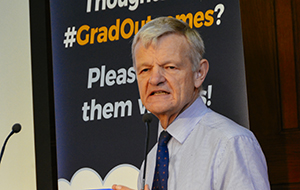RCVS publishes new set of competences for veterinary students to meet upon graduation
2 July 2020
The RCVS has published a new set of Day One Competences, which describe the knowledge and skills expected of veterinary students upon graduation.
The new competency model and underpinning Day One Competences was developed following detailed feedback from the profession during the Graduate Outcomes consultation.
The Graduate Outcomes consultation explored how the RCVS, working with the UK veterinary schools, could better prepare veterinary students for life in practice and ensure that new graduate vets were better supported during their first years in practice.
There was a significant response from the profession with valuable feedback being submitted which was used to finalise the new RCVS Day One Competences. The competences are described within a conceptual model of continuous learning and with animal welfare at its heart. There are four broad areas each containing detailed competences, which are:
- Personal leadership: the competences under this heading set out the attitudes and behaviours expected of a professional veterinary surgeon and includes knowledge of the RCVS Code of Professional Conduct, recognition of one’s own abilities and limitations, and how to react and/or act in different situations and circumstances.
- Professional commitment: these competences encompass the graduate’s professional capabilities around the business aspects of veterinary practice. Competences in this domain recognise that graduates are not expected to have full knowledge of how to run a successful business, but that they should be aware of the way the profession operates, both in terms of businesses that exist within the profession and also outside the profession in related areas.
- Reflective relationships: the competences under this heading concern professional relationships including with those whom graduates work directly with and those in other locations and areas of the profession as well as allied professionals and with clients. Understanding how to communicate and collaborate effectively is key for the competences within this domain, as they are central to forming and maintaining the relationships that will exist within a veterinary surgeon’s professional life.
- Vet capability: this domain describes the clinical competences, and encompasses the practical skills, techniques and underlying veterinary scientific knowledge that veterinary surgeons must possess upon graduation. By meeting these competences, graduates demonstrate that they are ready to carry out clinical procedures independently (to a day one competence standard). The majority of the competences lie within this domain.
 RCVS Council member Professor Stephen May (pictured right), who led the Graduate Outcomes Working Party which developed the consultation and the new Day One Competences, commented: “Developing new Day One Competences was one of the key strands of the Graduate Outcomes consultation and we are very glad that we can now deliver on this important work.
RCVS Council member Professor Stephen May (pictured right), who led the Graduate Outcomes Working Party which developed the consultation and the new Day One Competences, commented: “Developing new Day One Competences was one of the key strands of the Graduate Outcomes consultation and we are very glad that we can now deliver on this important work.
“While clinical and scientific skills will always be a central focus of a degree in veterinary medicine, the new framework recognises that professional (“non-technical”) skills, such as effective communication, relationship-building, reflective practice, business acumen and professional responsibility, are as important in successful practice as technical aspects of veterinary work.
"One of the key findings of the Vet Futures project, which in turn led to us launch Graduate Outcomes, was that a significant reason why new graduates sometimes felt disengaged with and disappointed by life in clinical practice, was the divide between the technical aspects of what they learned in vet school and the realities of life in practice where technical knowledge needs to be used effectively alongside the other important professional skills.
“The new Day One Competences build upon what the RCVS expects of new graduates in all these areas.”
Susan Paterson (pictured right), Chair of the RCVS Education Committee which approved the new document, added: “Over the coming years we look forward to working with the vet schools to ensure these competences continue to be incorporated and embedded within their curricula and hope that, in time, the new framework will help meet the aim to better prepare our graduates and new colleagues for life in practice.”
The full documentation on the Day One Competences can be found on our Publications page.
Work on other aspects of the Graduate Outcomes consultation – including the new Professional Development Phase, changes to Extra-Mural Studies and developing clinical education for general practice, is ongoing.